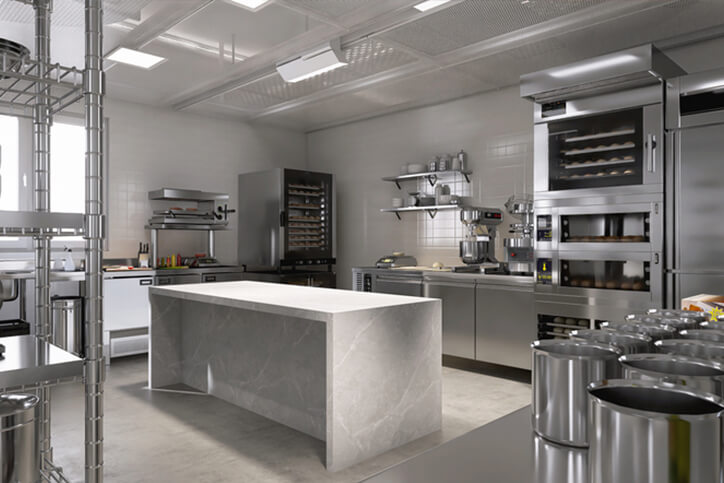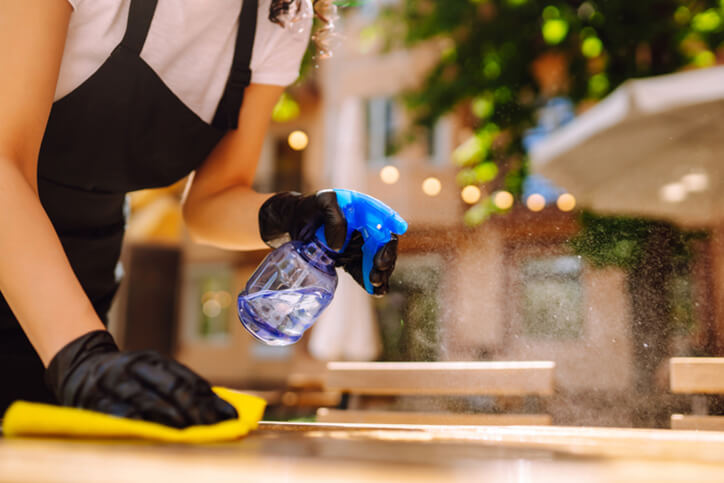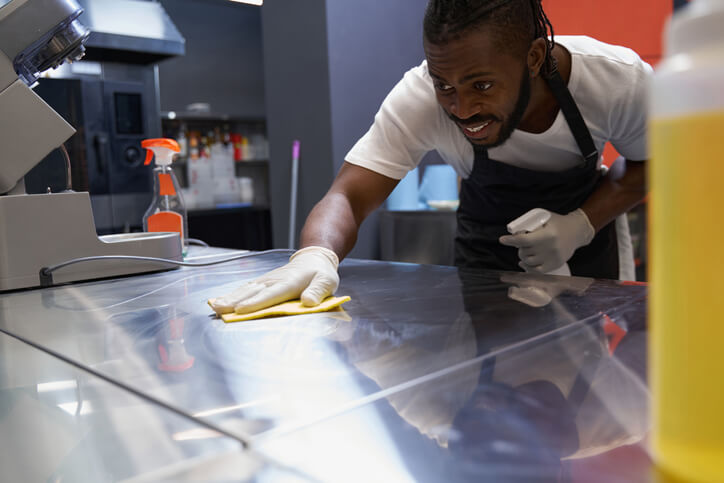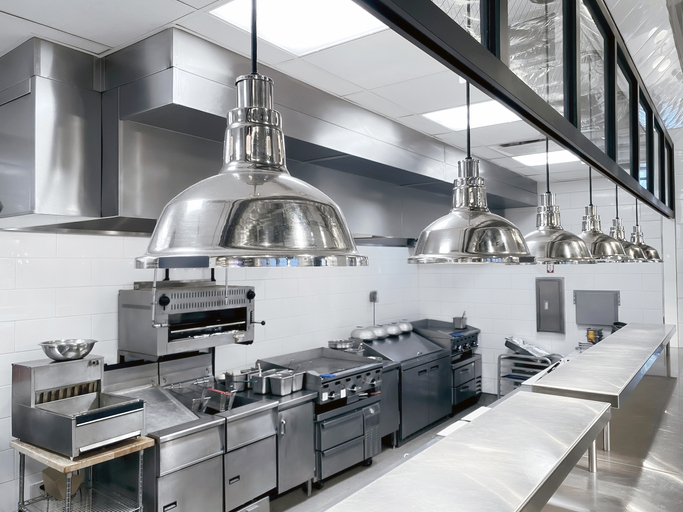Maintaining a clean and sanitary commercial kitchen is crucial for the success of any food business, whether it’s a restaurant, hotel, catering company, or corporate kitchen. Cleanliness impacts food safety, regulatory compliance, operational efficiency, and even the morale of your staff. This comprehensive guide explains how to clean a commercial kitchen, detailing best practices for floors, equipment, mats, hoods, and deep cleaning routines.
We’ll also discuss how professional services, like those offered by Regency Cleaning Services, can help you achieve an impeccably clean kitchen.
The Importance of a Clean Commercial Kitchen
A clean kitchen isn’t just about looking good–it’s essential for safety, functionality, and reputation. Proper cleaning:
- Ensures Food Safety: Clean surfaces prevent cross-contamination and the spread of harmful bacteria that could lead to foodborne illnesses.
- Meets Regulatory Standards: Health inspectors expect commercial kitchens to adhere to strict cleanliness standards. A dirty kitchen can result in fines, bad reviews, or even closures.
- Enhances Equipment Lifespan: Routine cleaning helps prevent grease and grime buildup, which can harm kitchen appliances.
- Enhances Productivity: A well-organized and clean kitchen enables staff to work more efficiently.
Given the high stakes, knowing how to clean a commercial kitchen thoroughly is critical.
Daily Cleaning Routines: The Foundation of a Clean Kitchen
Daily cleaning tasks form the backbone of your kitchen hygiene routine. These tasks must be completed at the end of each shift to ensure the kitchen is ready for the next day.
Key areas to focus on:
- Countertops and Food Prep Areas: After each use, wipe these surfaces with a food-safe disinfectant to remove bacteria, grease, and food particles.
- Sinks and Handwashing Stations: Use hot water and disinfectant to clean all sinks. Refill soap and sanitizer dispensers daily.
- Trash and Recycling Bins: Empty all bins, replace liners, and clean the interiors with a deodorizing spray to prevent odors.
- Floors: Sweep to remove loose debris and mop with a grease-cutting solution to prevent buildup. Pay special attention to corners and areas under appliances.
- Spills and Stains: Clean spills immediately to avoid hazards and reduce the risk of bacteria growth.
Consistent attention to these areas helps maintain a safe and inviting environment for both employees and customers.
How to Clean Commercial Kitchen Equipment?
Commercial kitchen equipment is the workhorse of your operation. Maintaining cleanliness ensures peak performance and prolongs its usability.
Ovens and Stoves
Regular oven and stove cleaning is essential to prevent grease buildup and ensure food is cooked evenly. Use a commercial-grade oven cleaner weekly to tackle baked-on stains. For stovetops, wipe them down after every use with a degreaser and soft cloth. Schedule professional deep cleanings for these appliances every six months to ensure internal components remain in good condition.
Deep Fryers
Deep fryers collect oil and grease, which can become a fire hazard if not cleaned regularly. Perform a “boil out” once a week by filling the fryer with water degreasing the solution, heating it, and scrubbing any remaining residue. Drain, rinse thoroughly, and dry completely before adding fresh oil.
Dishwashers
While dishwashers have some self-cleaning capabilities, they still require regular upkeep. Clean the filters daily and run a deliming agent through the machine weekly to prevent mineral buildup. Wipe down the door seals and edges, which can harbor grime and mold.
Coffee Machines
Coffee machines require regular cleaning to maintain the quality of beverages. Flush the machine with hot water and a specialized cleaning agent weekly. Pay attention to removable parts like carafes and filters, which should be cleaned with soap and hot water after every shift.

How to Clean a Commercial Kitchen Hood?
Your kitchen hood is responsible for removing smoke, grease, and heat from the cooking area. Neglecting its maintenance can result in grease buildup, leading to poor air quality and fire hazards.
Steps to clean a commercial kitchen hood:
- Remove Filters: Detach filters and soak them in hot water mixed with degreasing detergent.
- Scrub Interior Surfaces: Use a non-abrasive sponge and degreaser to clean the inside of the hood.
- Rinse and Dry: Thoroughly rinse all components with warm water and allow them to air dry before reassembling.
- Schedule Professional Cleanings: Every 3-6 months, have professionals deep-clean your ventilation system to remove grease from ducts and fans.
By maintaining your hood system, you’ll improve air quality and meet fire safety standards.
How to Clean a Commercial Kitchen Floor?
The floor in a commercial kitchen endures heavy foot traffic and frequent spills. Maintaining a clean floor is essential for both hygiene and safety.
Daily Floor Cleaning Routine
Begin by thoroughly sweeping the entire floor to clear away loose dirt and debris. Then mop the surface with a solution of warm water and a heavy-duty degreaser. For sticky or heavily soiled areas, use a stiff-bristled brush to scrub thoroughly. Ensure the floor is completely dry to reduce the risk of slips and falls.
Deep Floor Cleaning
Once a month, schedule a deep cleaning to address buildup in grout lines, corners, and under appliances. Use a floor scrubber machine or hire professionals for a more intensive cleaning process.
How to Clean Commercial Kitchen Mats?
Rubber mats are crucial for employee safety, providing anti-slip surfaces in high-traffic areas. However, these mats can trap grease, dirt, and bacteria if not cleaned regularly.
Steps to clean kitchen mats:
- Remove mats from the kitchen and rinse them with a hose to remove surface dirt.
- Fill a large tub or sink with hot water and add dish soap or a degreasing agent.
- Scrub the mats with a soft brush to dislodge grease and grime.
- Rinse thoroughly and allow the mats to air dry before placing them back in the kitchen.
Clean mats are not only hygienic but also help maintain a safe working environment for your staff.
How to Deep Clean a Commercial Kitchen?
Deep cleaning should be performed every 3-6 months, depending on your kitchen’s usage. This process involves cleaning areas and equipment that are not part of the daily routine.

Areas to Include in a Deep Clean
- Ceilings and Walls: Use a degreasing solution to clean grease and smoke stains.
- Refrigerators and Freezers: Empty shelves, discard expired food, and scrub the interiors with a sanitizing solution.
- Drains: Flush with hot water and drain-cleaning chemicals to prevent clogs and odors.
- Under Equipment: Move appliances and clean them underneath them to remove hidden dirt and debris.
Hiring professionals for deep cleaning ensures no area is overlooked, saving you time and effort.
Why Hire Regency Cleaning Services?
Maintaining a commercial kitchen can be time-consuming and labor-intensive. Professional cleaning services, like Regency Cleaning Services, provide a thorough and reliable solution. Here’s why you should consider us:
- Expert Knowledge: Our team is trained to clean all types of kitchen equipment and surfaces, ensuring optimal results.
- Health Code Compliance: We ensure your kitchen meets all local health and safety regulations.
- Specialized Tools and Products: We use industry-grade equipment and eco-friendly cleaning solutions to deliver superior results.
- Time Efficiency: Our services save you hours of labor, allowing you to focus on your business.

How to Schedule a Cleaning Service?
Scheduling a cleaning with Regency Cleaning Services is quick and easy:
- Contact Us: Call or visit our website to discuss your cleaning needs.
- Assessment: We’ll evaluate your kitchen and create a customized cleaning plan.
- Schedule: Choose a convenient time for our team to clean your kitchen.
- Execution: Sit back and relax while we handle the hard work.
Contact us Today
Maintaining a clean commercial kitchen is essential for the success of any food business. From learning how to clean commercial kitchen equipment to understanding the nuances of deep cleaning, consistent maintenance is vital. While daily tasks are manageable, enlisting professional help from Regency Cleaning Services ensures your kitchen remains spotless, safe, and compliant with health standards.
Contact us today to schedule a cleaning service and give your kitchen the care it deserves!


